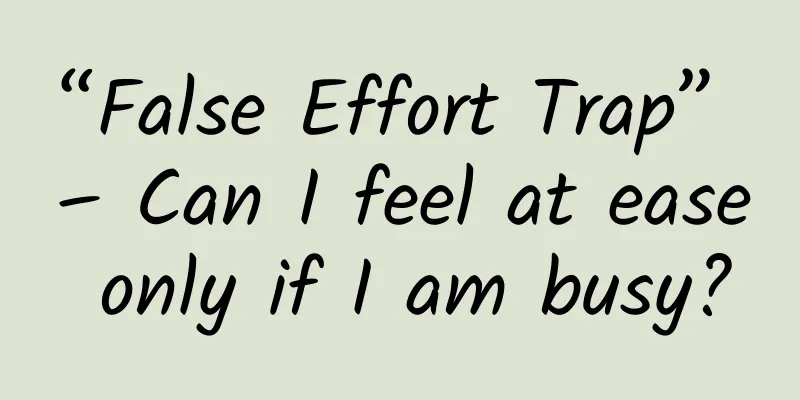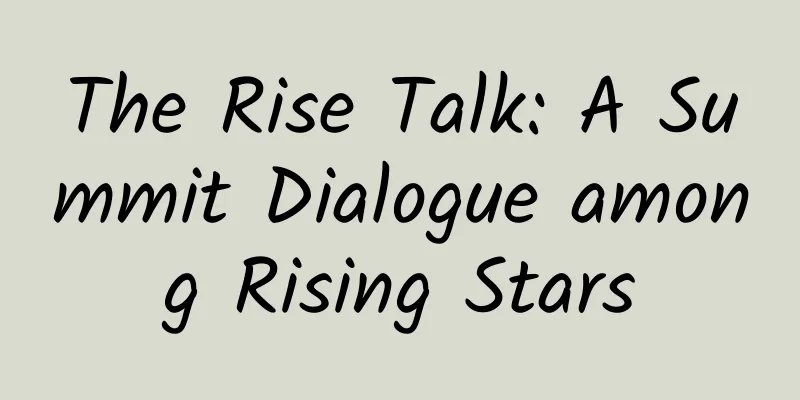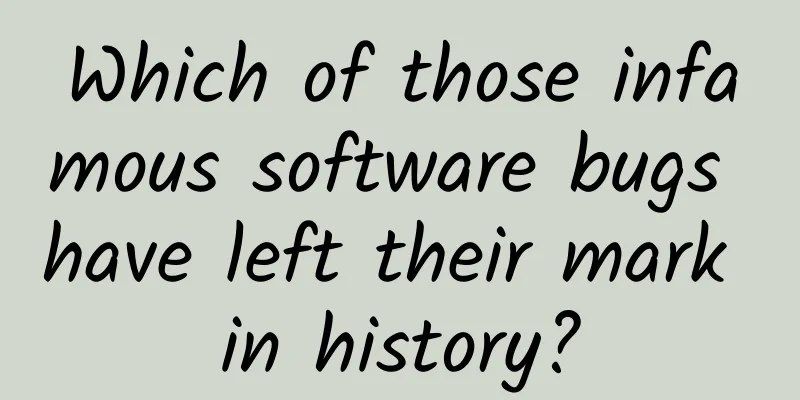“False Effort Trap” – Can I feel at ease only if I am busy?

|
For many people who work overtime, "being anxious when not busy" is a common problem, but the reasons behind it are different. What is the psychological significance of being busy? Is the inability to stop a psychological problem? And, in a fast-paced world, how should we coexist with being busy? This article will give you the answers. Being busy can make you smarter Psychologist Small found in a 2011 study that being busy can improve cognitive ability, and people with stronger cognitive abilities are busier. Small's team observed several activities in the daily lives of some elderly people, including sports activities, such as jogging and gardening; social activities, such as visiting friends; and cognitive activities, such as playing computer games and playing bridge, and then observed whether these elderly people often engaged in different activities. The results showed that these activities can slow down the decline in cognitive ability. However, the lifestyles of those elderly people with more severe cognitive decline are not so rich. In addition to slowing down cognitive decline, a busy life also brings people various challenges, allowing them to learn new things and engage in challenging tasks. This forces the brain to leave its comfort zone, think, break through, and make the brain sharper. With a sharp mind, people will be more willing to accept new challenges, and naturally they will not be idle. American cognitive neuroscientist Festini is also investigating whether busy people have better brain cognitive functions in the "Dallas Brain Life Expectancy Study". In this experiment, the researchers recruited 330 subjects aged 50 to 89, and first asked them about their activities for the day to assess how busy they were. The questions asked included how many times they were so busy that they didn't have time to eat or sleep, and how many times they felt exhausted because there were too many things to do. Next, the experimenters conducted a series of tests to assess the subjects' brain functions, such as reaction speed, memory, and thinking ability. The tests they designed included asking the subjects to find the differences in a long string of numbers. Or put a small ball in a box, and then keep changing the position of the box, and then ask the subjects to find the box with the small ball. For example, shuffle the original order of boxes of different colors, and then ask them to recall the previous order, and so on. What was the final result? The experimenters found that those who kept busy performed better in brain function tests than those who were not busy. Moreover, this experimental result applies to both 50 and 89-year-olds. In addition to these middle-aged and elderly subjects, Festini also said that this experimental conclusion can cover the entire adult population over 20 years old. Can't stop, it's a new "epidemic" Although being busy can improve cognitive function, compulsive busyness can have a negative impact on physical and mental health. Psychologist Brigid Schulte mentioned in a 2017 monograph that the reason why people keep themselves busy may be because today's working environment encourages people to become "workaholics." Work performance often seems to be closely related to personal evaluation. More and more people believe that only by working continuously can they prove that they are capable and responsible; even employees who are relatively idle will pretend to work continuously because they are afraid that if they appear to be idle, they will be accused of "slacking off" or "not being sociable". People advocate work, but have misunderstandings about leisure and fail to realize the importance of leisure. For example, they think that leisure is just a waste of time, and even feel guilty about leisure because "there is no output" during leisure. Compared with men, it is more difficult for women to enjoy leisure time with a clear conscience. Because women are more educated to consider the needs of others, many women can only stop being busy when others start to relax. For example, one woman said: "Every time I go out to have dinner with friends, I blame myself: How can you leave your children and family to go out and play?" Everyone talks about work-life balance, but it seems that no one dares to really have it. Whenever you are not working, it seems to be a reason for negative evaluation. At the same time, the popularity of mobile Internet has given rise to an "always on" workplace culture. There is no absolute separation between our work and life. It is normal to send and receive emails and handle work anytime and anywhere on weekends or vacations. Why not try to recall when was the last time you could "completely not handle any work"? This workplace culture has changed people's views on "busyness" and "rest". More and more employers and employees have begun to believe that "constant busyness means fulfilling one's duties", "resting is passive laziness", "the busier a person is, the more valuable he is to the company", etc. In "always online", busyness is gradually equated with "dutifulness" and "success". The always-on workplace culture has infected everyone with a kind of competitive pressure. If you are not so busy, will you become a loser? A person with no future? Even if you don’t want to be busy, once you relax, you may really be evaluated by your boss and others as "lazy", "irresponsible", or "not good enough". How can this not make people feel stressed? What to do if you are "busy" when you disagree with others For those who are used to using busyness to treat anxiety, this needs to be constantly alert: being busy can only temporarily relieve anxiety, but it may bring more long-term consequences. We need to learn to enjoy the rest time between tasks and not always want to stop. Studies have found that taking a 15-30 minute nap during work can help improve memory and allow people to "clear" their brains in time during sleep, reduce attention residue, and prepare for exposure to new information later. The positive meaning of being busy only exists when it can really lead you to a better life. What is a good life is very different for everyone. No one can answer this question for you, including all those who will criticize you for not looking busy enough. We have to find our own answer, and then we can find the rhythm of work and life that really suits us. References Monk, TH, Buysse, DJ, Welsh, DK, Kennedy, KS, & Rose, LR (2001). A sleep diary and questionnaire study of naturally short sleepers. Journal of Sleep Research, 10(3), 173-179. Dahl, M. (2015). Every Weekend Should Be a3-Day Weekend. Science of Us. Damaske, S., Smyth, JM, & Zawadzki,MJ (2014). Has work replaced home as a haven? Re-examining Arlie Hochs child'sTime Bind proposition with objective stress data. Social Science &Medicine, 115,130-138. Gordon, AM, & Chen, S. (2014). TheRole of Sleep in Interpersonal Conflict Do Sleepless Nights Mean Worse Fights? SocialPsychological and Personality Science, 5(2), 168-175. Griffiths, MS & Karanika-Murray, M. (2012). Contextualizing over-engagement in work: Towards a more global understanding of workaholism as an addiction. Journal of Behavioral Addiction, 1(3), 87-95. Hsee, CK, Yang, AX, & Wang, LY(2010). Idleness aversion and the need for justifiable busyness. PsychologicalScience, 21(7), 926-930. Kolbert, E. (2014). No time. The NewYorker. Leroy, S. (2009). Why is it so hard to domy work? The challenge of attention residue when switching between work tasks. Organizational Behavioral and Human Decision Processes, 109(2), 168-181. Perlow, LA & Porter, JL (2009). Making time off predictable and required. Harvard Business Review. Soong, J. (2010). The secret power of naps.WebMed. Surowiecki, J. (2014). The cult of overwork. The New Yorker. Tsilimparis, J. (2018). Existentialdespair: A deeper cause of human anxiety. PsychCentral. Virtanen, M., Stansfeld, SA, Fuhrer, R., Ferrie, JE, & Kivimäki, M. (2012). Overtime work as a predictor of majordepressive episode: a 5-year follow-up of the Whitehall II study. PloS one,7(1), 1-5. This article is produced by Science Popularization China-Starry Sky Cultivation Program. Please indicate the source when reprinting |
<<: @2022 College Entrance Examination, please accept this college entrance examination tips
Recommend
Why hasn’t Material Design become popular in domestic apps?
[[159342]] Two years ago, the first order Larry P...
How to read the blood test report?
I went to the hospital for a cold and had my bloo...
Why is radar called the "clairvoyance" in modern warfare?
Radar is a device that uses electromagnetic waves...
Let me show you some colors! The source of color in the food world
Food pigments are food additives that can be cons...
Practical teaching of Doudian, Showcase, Xuelang, Enterprise Account, Selected Alliance, suitable for novices to quickly get started
Course Contents: 1.1. Opening and application of ...
Boyong Investment Research Think Tank in 2021 will open up the underlying investment logic
2021 Boyong Investment Research Think Tank, Openi...
Daily operation and promotion methods of new media operation accounts
When doing new media operations , most of the mea...
Sunscreen may damage corals. How can you protect yourself from the sun when you go to the beach?
In 2018, the Republic of Palau restricted the sal...
Foreign media: Size and function are important for iPhone to sell well
Foreign media analysis said that the market deman...
Android 5.0 is a tragedy: automatic encryption makes the system super slow
On November 24, in response to the endless reques...
Zhejiang's pneumonia epidemic emergency response has been adjusted to level two! What is the difference between level one and level two?
Recently, the total number of cured and discharge...
List of key epidemic areas in Shanghai in 2022: Which specific communities are under closed management? Attached is the latest list!
In order to end this round of local epidemic as s...
If you choose autumn clothes like this, you might as well not wear them at all? Learn about the "three-layer dressing rule"
When I was little, my mother liked to buy me this...
What changes does TCL's high-end sub-brand XESS represent for the TV industry as a disruptor again 35 years later?
A 35-year history is enough to be called a develo...









